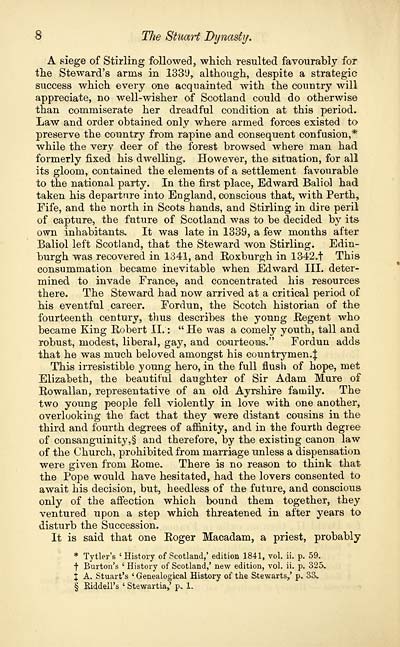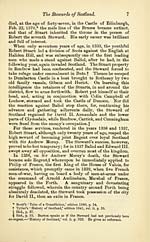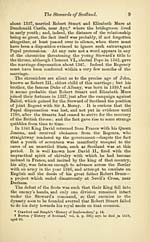Stuart dynasty
(28) Page 8
Download files
Complete book:
Individual page:
Thumbnail gallery: Grid view | List view

8 The Stuart Dynasty.
A siege of Stirling followed, which resulted favourably for
the Steward's arms in 133 l J, although, despite a strategic
success which every one acquainted with the country will
appreciate, no well-wisher of Scotland could do otherwise
than commiserate her dreadful condition at this period.
Law and order obtained only where armed forces existed to
preserve the country from rapine and consequent confusion,*
while the very deer of the forest browsed where man had
formerly fixed his dwelling. However, the situation, for all
its gloom, contained the elements of a settlement favourable
to the national party. In the first place, Edward Baliol had
taken his departure into England, conscious that, with Perth,
Fife, and the north in Scots hands, and Stirling in dire peril
of capture, the future of Scotland was to be decided by its
own inhabitants. It was late in 1339, a few months after
Baliol left Scotland, that the Steward won Stirling. Edin-
burgh was recovered in 1341, and Roxburgh in 1342.t This
consummation became inevitable when Edward III. deter-
mined to invade France, and concentrated his resources-
there. The Steward had now arrived at a critical period of
his eventful career. Fordun, the Scotch historian of the
fourteenth century, thus describes the young .Regent who
became King Robert II. : " He was a comely youth, tall and
robust, modest, liberal, gay, and courteous." Fordun adds
that he was much beloved amongst his countrymen.J
This irresistible young hero, in the full flush of hope, met
Elizabeth, the beautiful daughter of Sir Adam Mure of
Rowallan, representative of an old Ayrshire family. The
two young people fell violently in love with one another,
overlooking the fact that they were distant cousins in the
third and fourth degrees of affinity, and in the fourth degree
of consanguinity,! and therefore, by the existing canon law
of the Church, prohibited from marriage unless a dispensation
were given from Rome. There is no reason to think that
the Pope would have hesitated, had the lovers consented to
await his decision, but, heedless of the future, and conscious
only of the affection which bound them together, they
ventured upon a step which threatened in after years to
disturb the Succession.
It is said that one Roger Macadam, a priest, probably
* Tytler's ' History of Scotland,' edition 1841, vol. ii. p. 59.
f Burton's ' History of Scotland,' new edition, vol. ii. p. 325.
X A. Stuart's ' Genealogical History of the Stewarts,' p. 33.
§ Riddell's ' Stewartia,' p* 1.
A siege of Stirling followed, which resulted favourably for
the Steward's arms in 133 l J, although, despite a strategic
success which every one acquainted with the country will
appreciate, no well-wisher of Scotland could do otherwise
than commiserate her dreadful condition at this period.
Law and order obtained only where armed forces existed to
preserve the country from rapine and consequent confusion,*
while the very deer of the forest browsed where man had
formerly fixed his dwelling. However, the situation, for all
its gloom, contained the elements of a settlement favourable
to the national party. In the first place, Edward Baliol had
taken his departure into England, conscious that, with Perth,
Fife, and the north in Scots hands, and Stirling in dire peril
of capture, the future of Scotland was to be decided by its
own inhabitants. It was late in 1339, a few months after
Baliol left Scotland, that the Steward won Stirling. Edin-
burgh was recovered in 1341, and Roxburgh in 1342.t This
consummation became inevitable when Edward III. deter-
mined to invade France, and concentrated his resources-
there. The Steward had now arrived at a critical period of
his eventful career. Fordun, the Scotch historian of the
fourteenth century, thus describes the young .Regent who
became King Robert II. : " He was a comely youth, tall and
robust, modest, liberal, gay, and courteous." Fordun adds
that he was much beloved amongst his countrymen.J
This irresistible young hero, in the full flush of hope, met
Elizabeth, the beautiful daughter of Sir Adam Mure of
Rowallan, representative of an old Ayrshire family. The
two young people fell violently in love with one another,
overlooking the fact that they were distant cousins in the
third and fourth degrees of affinity, and in the fourth degree
of consanguinity,! and therefore, by the existing canon law
of the Church, prohibited from marriage unless a dispensation
were given from Rome. There is no reason to think that
the Pope would have hesitated, had the lovers consented to
await his decision, but, heedless of the future, and conscious
only of the affection which bound them together, they
ventured upon a step which threatened in after years to
disturb the Succession.
It is said that one Roger Macadam, a priest, probably
* Tytler's ' History of Scotland,' edition 1841, vol. ii. p. 59.
f Burton's ' History of Scotland,' new edition, vol. ii. p. 325.
X A. Stuart's ' Genealogical History of the Stewarts,' p. 33.
§ Riddell's ' Stewartia,' p* 1.
Set display mode to:
![]() Universal Viewer |
Universal Viewer | ![]() Mirador |
Large image | Transcription
Mirador |
Large image | Transcription
Images and transcriptions on this page, including medium image downloads, may be used under the Creative Commons Attribution 4.0 International Licence unless otherwise stated. ![]()
| Histories of Scottish families > Stuart dynasty > (28) Page 8 |
|---|
| Permanent URL | https://digital.nls.uk/94818102 |
|---|
| Description | A selection of almost 400 printed items relating to the history of Scottish families, mostly dating from the 19th and early 20th centuries. Includes memoirs, genealogies and clan histories, with a few produced by emigrant families. The earliest family history goes back to AD 916. |
|---|

